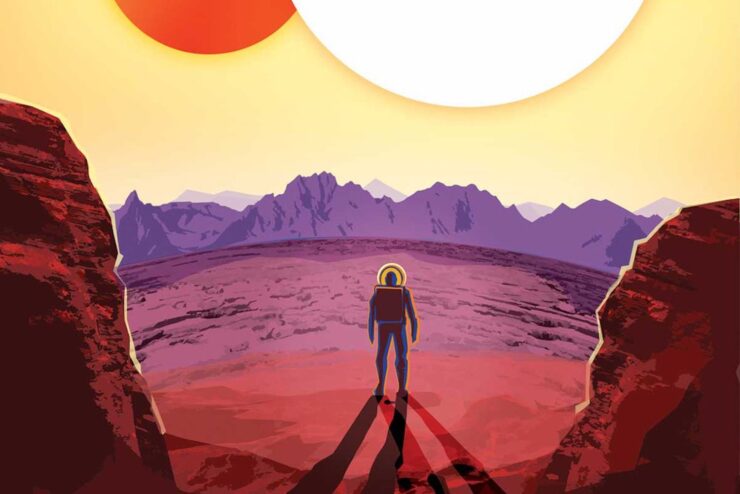I’m fascinated by planets. Earth, of course, is my favorite, and like many people I have a soft spot for dear old Pluto—planets that arouse a positive sort of awe, with all their boundless beauty. But I’m also drawn to stories about planets, real and fictional, whose descriptions make you go “nope” and allow you to truly appreciate all the familiar quirks of our home planet, from potted plants and waterfalls to mosquitoes and concrete jungles. Here’s a list of some planets dreamed up by SFF authors that I find particularly terrifying…
“Old Seeds” by Owen Leddy
When Renny wakes up from stasis, xe finds xe has finally reached the planet xe was assigned to work on, a planet that does not even have a name because it’s “no longer a place, but a product to be processed.” As humanity expanded into the universe, it needed more and more area for agriculture. Planets like the one Renny has been sent to act as giant fields, with nothing on their surface except endless acres of crops. For Renny, it’s overwhelming already to know that the life xe knew and the people xe loved have been gone for more than a century. How can they xe deal with that grief on a planet so dull, surrounded by such oppressive landscapes?
“The Bleeding and the Bloodless” by Ruth Nestvold
When Devlin woke up, he found himself being carried on a stretcher by unfamiliar people on an unfamiliar planet—and not on Earth, as planned. Some of his crew had survived and the natives were treating them well.
But no planet is without its problems. The society on this one feels primitive but still has some useful technology. Why are the people feeding and housing Devlin’s crew, but not letting them leave? Why are they always guarded? And why does this matriarchy not seem entirely kind to the crew’s women?
“The People from the Dead Whale” by Djuna, translated by Jihyun Park and Gord Sellar
Of all the planets on this list, the one described in this short story is the most weirdly fascinating. An “ocean world,” this planet has two continents—the side with a perpetual morning has nothing but extreme heat and sand, while its equal, opposite continent has nothing but darkness and ice. Between these giant continents is a channel—in the water, giant whales, on the backs of which people have lived for millennia. However, a disease has spread among the whales and people are to scrambling to find healthy ones, while also struggling to survive in their boats and desperately trying to stay away from the extreme heat and cold on either continent.
“Thin Ice” by Kemi Ashing-Giwa
TAM-19607e is slowly freezing to death. Once a culturally-rich world, it has been taken over by Half-Brilliant, a creature of silicon and metal, who has put the natives in stasis and now extracts their poems and stories to create new art. The only witness to Half-Brilliant’s new reality—the only one excepted from statis because of their lack of imagination—watches the planet and its culture die. In 2110 words, Kemi Ashing-Giwa managed to make me more terrified of the possibilities of AI than the unending torrent of news about ChatGPT has in a year.
“Invisible Planets” by Hao Jingfang, translated by Ken Liu
Hao describes various planets in this conversational narrative, and while it is fascinating to learn about new worlds and new societies, novelty sometimes comes with a surprising cost. When the familiar takes unusual turns, even if harmless, it is difficult to feel comfortable. How would you like to live on a planet, for example, where giant people from the poles, unaware of the tiny people living on the equator, crush thousands to their death? What about the planet where people are always evolving, growing several arms to make their work easier, or slimming their waists thinner than noodles? Most of the places described here may not be physically dangerous, but they might mess you up psychologically, playing with your ideas of the familiar and the unfamiliar, constantly making you question how things work.
“Do Not Go Gentle” by Wendy Nikel
Humans moved to a planet where daylight lasts sixteen years. They felt that was enough time to settle down, make things work. Now the night is catching up and people are leaving, running away from the darkness towards light, for those who stay behind go mad. In this rush to survive, what do you do when you look towards the sun, but your loved ones choose to stay behind?
Sometimes, the danger is not the planet’s fault. Sometimes, it’s us, it’s inside us, and how we think about “day” and “night” and the twilight that separates the two.
“Evolution” by Paul Crenshaw
I’ve saved the best most terrifying planet for the end. The Beagle has been on this planet for only three days, and now is being repaired by its crew. They can see the remains of the Albatross nearby, which landed on the planet a century ago. In three days, the crew has seen all there is to see—all they needed to see: the planet’s flora, fauna, and the violence that comes at night. Fixing the Beagle and leaving the planet before dark is now a matter of survival. Will they survive, and will they be able to warn others about what happened?
Ratika Deshpande (she/her) is currently writing a series of Letters to a Young Essayist. She also runs The Metronome, an online resource for psychology students and professionals.










